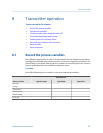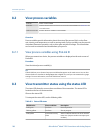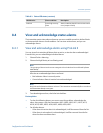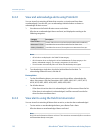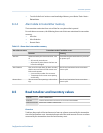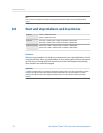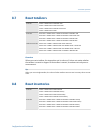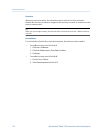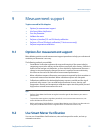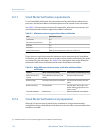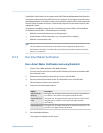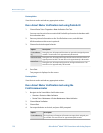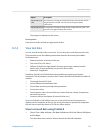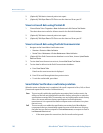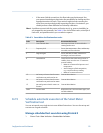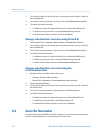
9 Measurement support
Topics covered in this chapter:
•
Options for measurement support
•
Use Smart Meter Verification
•
Zero the flowmeter
•
Validate the meter
•
Perform a (standard) D1 and D2 density calibration
•
Perform a D3 and D4 density calibration (T‐Series sensors only)
•
Perform temperature calibration
9.1 Options for measurement support
Micro Motion provides several measurement support procedures to help you evaluate and
maintain your flowmeter's accuracy.
The following methods are available:
• Smart Meter Verification evaluates the structural integrity of the sensor tubes by
comparing current tube stiffness to the stiffness measured at the factory. Stiffness is
defined as the load per unit deflection, or force divided by displacement. Because a
change in structural integrity changes the sensor’s response to mass and density,
this value can be used as an indicator of measurement performance.
• Meter validation compares flowmeter measurements reported by the transmitter to
an external measurement standard. Meter validation requires one data point.
• Calibration establishes the relationship between a process variable and the signal
produced at the sensor. You can calibrate the flowmeter for zero, density, and
temperature. Density and temperature calibration require two data points (low and
high) and an external measurement for each.
Tips
• Perform Smart Meter Verification at regular intervals to get the best data on your meter's
performance.
• To prove the meter against a regulatory standard, or to correct measurement error, use
meter validation and meter factors.
• Before performing a field calibration, contact Micro Motion to see if there is an alternative. In
many cases, field calibrations have a negative effect on measurement accuracy.
9.2 Use Smart Meter Verification
You can run a Smart Meter Verification test, view and interpret the results, and set up
automatic execution.
Measurement support
Configuration and Use Manual 115



